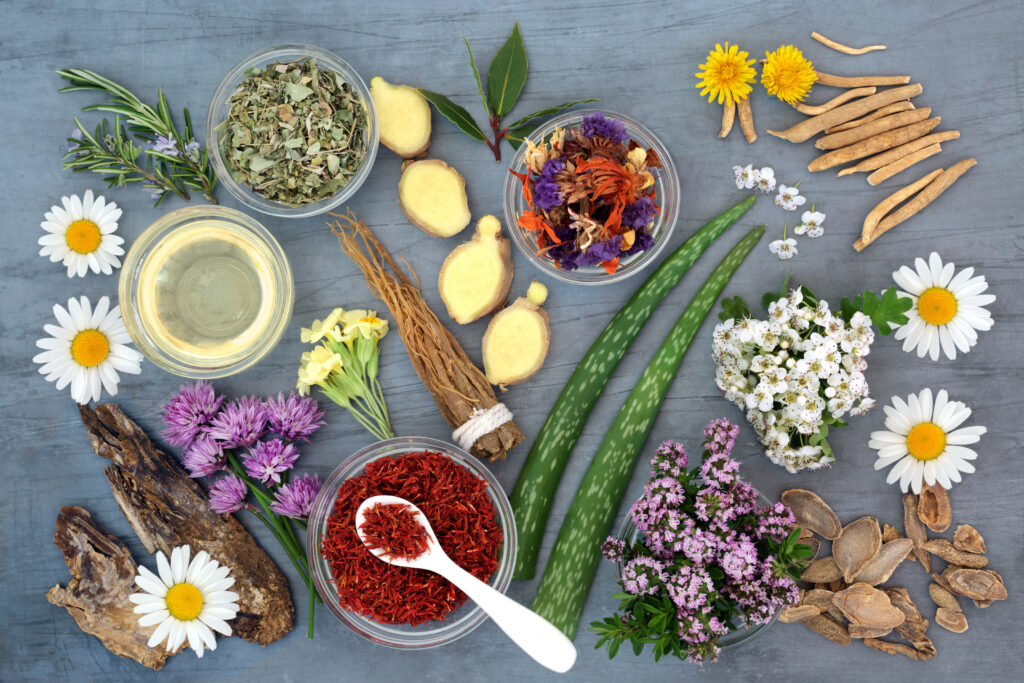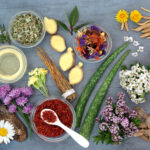Have you ever wondered how to use botanical medicine and herbs for natural healing at home?
It is estimated that around 4 billion people globally rely on herbal medicine as an integral part of their healthcare. In 2023, the WHO found 42% of the US reports using complementary medicine. Using medicinal herbs is something many of us are already doing unknowingly – whether it’s the spices in our meals, the soothing herbal teas we sip, or the plant-based ingredients in modern medications. Herbs can offer a gentle yet effective way to support the body and mind, manage common health concerns, and promote overall well-being. Using herbal medicine also provides a meaningful way to reconnect with nature and take a more empowered role in your health journey.
If you are not sure where to start with herbal medicine this article will introduce you to some of the most effective and well-researched healing herbs for addressing everyday ailments and enhancing your well-being.
Adaptogenic herbs for energy and balance
Ashwagandha (Withania somnifera). Ashwagandha is a traditional Ayurvedic herb classified as an adaptogen—a group of botanicals known for their ability to support the body’s physiological response to stress, enhance resilience, and promote balance. Adaptogens are often used for those who are fatigued, under high stress, or in burnout as they improve energy, endurance, and mental clarity. Adaptogens help modulate the stress response system, particularly the hypothalamic-pituitary-adrenal (HPA) axis, which is central in regulating cortisol and other stress hormones. Ashwagandha, in particular, has been shown to lower high cortisol levels, while also influencing neurotransmitters such as GABA and serotonin. A meta-analysis done in 2022 found that ashwagandha significantly reduced both perceived stress and anxiety symptoms compared to placebo.
Calming herbs for stress relief
Chamomile (Matricaria chamomilla) is a well-established botanical known for its calming/anxiolytic properties. Clinical studies have demonstrated its effectiveness in improving sleep quality and reducing symptoms of moderate to severe generalized anxiety. Chamomile is also traditionally used as a gentle digestive aid and anti-inflammatory, commonly prepared as a tea from dried flowers. Its therapeutic effects are attributed to several bioactive compounds, including apigenin, which interacts with GABA receptors to promote relaxation. Chamomile is generally regarded as a safe herb with a low risk of adverse effects; however, its use is typically cautioned against during pregnancy due to limited safety data.
Herbs for digestion and Nausea
Ginger (Zingiber officinale) is widely recognized for its antiemetic (anti-nausea) properties, with clinical studies supporting its specific efficacy in reducing nausea and vomiting associated with pregnancy and chemotherapy. It is generally considered safe across a range of populations, including pregnant individuals when used at appropriate dosages. In Traditional Chinese Medicine, ginger is classified as a warming herb, and is used to support digestion and stimulate circulation. Pharmacologically, ginger exhibits anti-inflammatory and analgesic effects, primarily through the inhibition of nuclear factor-kappa B (NF-κB) and cyclooxygenase (COX) pathways. These actions make ginger a valuable therapeutic agent not only for gastrointestinal symptoms but also for managing inflammatory and pain-related conditions as well.
Immune-boosting herbs for cold and flu season
Elderberry (Sambucus nigra). Elderberry has been shown in clinical and in vitro studies to reduce the severity and duration of upper respiratory tract infections, including the common cold and influenza. Its antiviral activity is thought to be mediated through multiple mechanisms, including inhibiting viral replication and enhancing the immune response. Specifically, elderberry has been found to stimulate dendritic cell-mediated T cell responses and stimulate the production of pro-inflammatory cytokines, supporting a more robust immune response when taken at the onset of infection. Elderberry preparations, particularly syrups, are commonly used and are generally considered safe, including for use in children. More evidence-based botanicals and natural ways to give your immune system a boost can be found here.
Natural sleep aids and relaxing herbs
Valerian (Valeriana officinalis). Valerian is a medicinal root traditionally used for the management of insomnia and sleep disturbances. Clinical studies have demonstrated its ability to improve both sleep onset, latency, and overall sleep quality, often with fewer adverse effects compared to placebo or pharmaceutical agents (such as benzodiazepines). Valerian exerts its sedative effects primarily through modulation of the gamma-aminobutyric acid (GABA) system – by increasing GABA availability and inhibiting its breakdown, it promotes a calming effect on the central nervous system. However, due to variability in the extract’s standardization as well as its interaction with other sleep/sedative medications, it is important to consult with a healthcare professional before use.
Anti-inflammatory herbs for pain relief
Turmeric (Curcuma longa). Turmeric is a bright orange root commonly often used in traditional cooking and wellness juices. Turmeric contains curcumin as its principal bioactive compound. Curcumin exhibits potent anti-inflammatory and analgesic properties, largely through its ability to modulate several key inflammatory pathways, including nuclear factor-kappa B (NF-κB), cyclooxygenase (COX), interleukin-1 (IL-1), and interleukin-6 (IL-6). Studies have shown that curcumin may offer pain relief comparable to nonsteroidal anti-inflammatory drugs (NSAIDs) in certain conditions, with a more favorable side effect profile. Additionally, curcumin has been found to lower levels of C-reactive protein (CRP), an important marker of systemic inflammation. These mechanisms make turmeric a valuable botanical intervention not only for musculoskeletal pain, and any conditions or issues that are due to inflammation.
Boswellia (Boswellia serrata). Boswellia may be best known for its fragrant resin, frankincense, but it is so much more than just a beautiful scent – it’s a powerful anti-inflammatory and analgesic herb. Its active compounds, particularly boswellic acids, work by inhibiting key inflammatory pathways, including leukotriene B4 and the 5-lipoxygenase (5-LOX) enzyme. Boswellia has been widely studied for its effectiveness in managing osteoarthritis, where it has been shown to reduce pain and stiffness and improve joint mobility. It’s often used in combination with other anti-inflammatory herbs for enhanced relief in joint-related issues. More recently, research has begun to explore Boswellia’s potential benefits beyond joint health, with studies indicating its anti-inflammatory properties may also support improvements in metabolic syndrome markers like hemoglobin A1C and total cholesterol.
Detoxifying herbs for liver health
Milk thistle (Silybum marianum). Milk thistle is a well-known herbal remedy due to its liver-supportive properties. It contains a range of active compounds – most notably silymarin, silybin, and other flavonoids – that contribute to its antioxidant, liver-protective, and liver-restorative effects. In cases of chronic liver conditions such as cirrhosis and non-alcoholic fatty liver disease (NAFLD), silymarin has been shown to reduce liver damage and support the regeneration of healthy liver cells. Research indicates that it helps lower liver injury markers like ALT and AST, while also improving metabolic indicators such as cholesterol and triglyceride levels. These benefits extend beyond liver health, making milk thistle valuable in supporting metabolic conditions and reducing complications related to poor blood sugar control.
The information in this post is for educational purposes only and is not intended to replace medical advice. If you’re interested in learning more about how these herbs can support your unique health needs or if you’re looking for more personalized guidance on adding botanical medicine into your routine, consider consulting a licensed naturopathic doctor.





